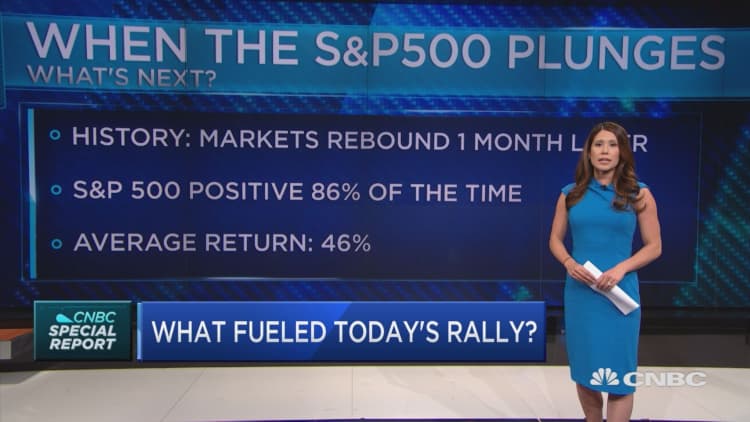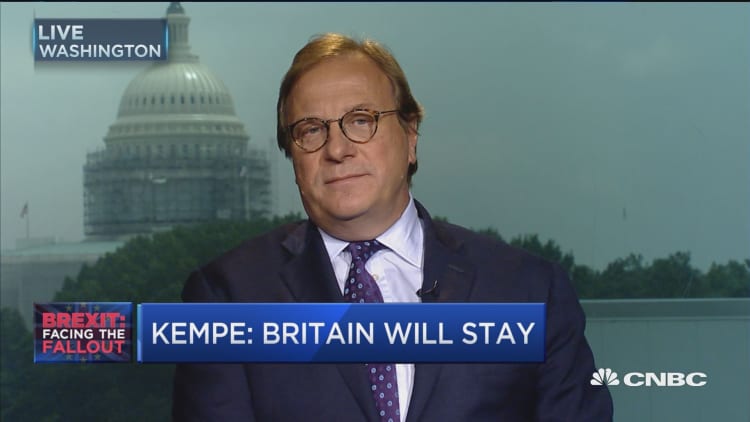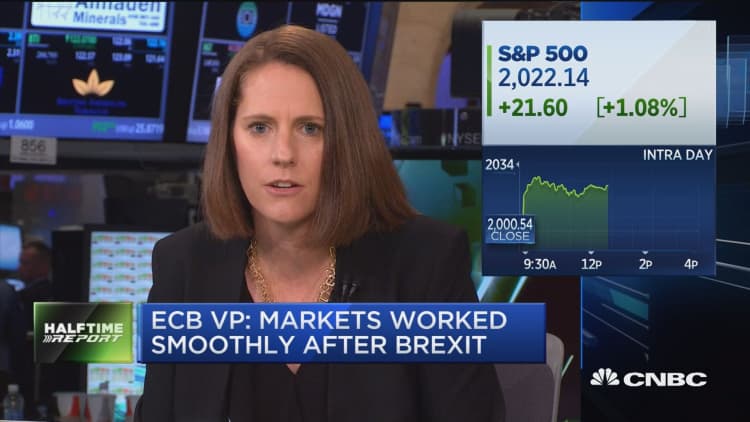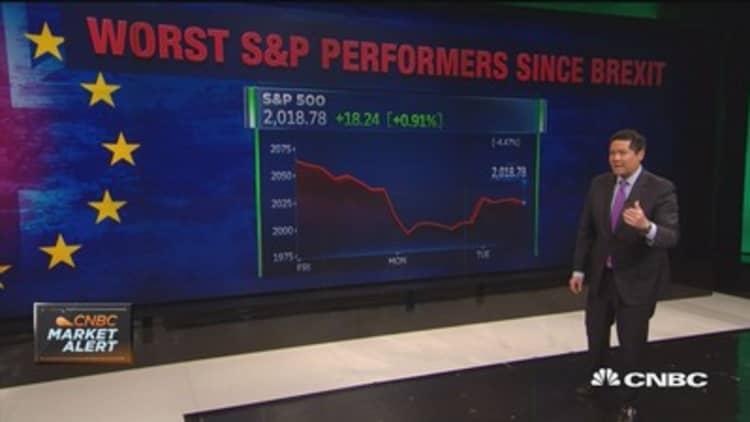
Federal Reserve Chair Janet Yellen's favorite inflation indicator, as well as fresh data on income and spending, could temporarily distract markets from the Brexit on Wednesday.
The PCE inflation data could be important because futures markets are now reflecting a chance that the Federal Reserve could actually cut interest rates before the end of the year, instead of raise them.
If there were a real move higher in inflation, it would be one thing that could prod the Fed to consider hiking rates and certainly change market expectatins. As for now, the Fed is believed to be on hold until the end of the year at the earliest.
The inflation measure is expected to show just a slight increase, but remain subdued and below the Fed's 2 percent target. The 8:30 a.m. EDT report is expected to show that core PCE prices rose 0.2 percent in May, or 1.7 percent year over year. Some other data is beginning to show signs that wages and other inflation measures are rising.
The futures-market odds shifted from a chance of a rate hike to a better chance of a rate cut by December, as traders reacted to the recent volatility around the U.K.'s surprise vote to leave the European Union.
Consumer spending, expected to rise 0.4 percent, is also an important number due on Wednesday, coming the day after revisions to first-quarter GDP showed that consumer spending growth slowed – a red flag for the economy. Consumption grew by 1.5 percent for the first quarter, lower than the prior estimate of 1.9 percent.
"This is really important for the domestic outlook. Obviously, markets are more focused on what's happening overseas but at home in the U.S., separate from the risk from abroad, we've been tracking the data closer than ever trying to figure out what's going on," said Jesse Hurwitz, U.S. economist at Barclays.
Hurwitz expects the consumer spending number to be stronger than consensus – up 0.5 percent. He said retail sales data and other data showed that spending was improving, and the second quarter could be stronger.
"We're tracking 3.8 percent consumption growth for Q2 for now," he said.
But the first-quarter revision was worrisome since it showed a further deceleration in the trend, and it would be important to show a bounce-back in spending. "The softness in consumption in the first quarter is a little more pronounced, so therefore a little bit more concerning at this point," he said.
Hurwitz expects personal income to rise by 0.3 percent. Pending home sales are released at 10 a.m. and economists expect to see a 2 percent decline.
The data may get the attention of markets, but the bigger story will continue to be what goes on with the Brexit, as European leaders met in Brussels on Wednesday to discuss the pending withdrawal of the U.K. from the European Union.
Risk markets rebounded Tuesday, bonds sold off, and currency markets steadied. The S&P 500 was up 1.8 percent at 2,036, and the 10-year Treasury yield rose to 1.46 percent. The pound was at 1.33 to the dollar in late trading.
Oil gained sharply and could be a factor again Wednesday, as the U.S. Energy Information Administration releases inventory data at 10:30 a.m. EDT. Speculation the API data would show a large drawdown after Tuesday's stock market close helped lift oil futures Tuesday. West Texas Intermediate crude futures closed at $47.85 per barrel, up 3.2 percent, and they continued to rise above $48 per barrel after the API data showed a larger draw than expected.
Strategists said it was not yet time to signal an all clear for markets after the Brexit sell-off, since there were so many uncertain aspects of how the separation would work and how it would affect the U.K. and euro zone economies. The other concern is whether it will pressure financial conditions and filter into economies around the globe.
"We're neutral (on U.S. stocks)…This is basically a flat year for the market with a lot of ups and downs," said Jeff Kleintop, Charles Schwab's chief global investment strategist. He said investors needed to stay diversified. "Past shocks suggest there's more downside."
Kleintop said based on history, the market could have its ups and downs after the selloff that took more than 5 percent off the Friday and Monday. But based on other periods, the market selloff could continue for several months before reversing.



Kleintop looked at market behavior after other shocks, and in three major events, he found a similar pattern.
"When I look back at some of these prior shocks we didn't see huge down days. We saw slow movement, as people assessed the outlook. The big drops tend to come on the first day. There's usually a 3 to 6 percent drop on the first day. Then on average, markets were down 11 to 16 percent," he said. "Stocks tended to bottom over two to three months, but they were actually back to their pre-shock level about four months later."
Kleintop studied the period after the March, 2011 Japanese earthquake when the Nikkei fell 6 percent on the first day, but 16 percent in total before recovering four months later. During the European debt crisis, when Spain unveiled an austerity budget resulting in labor strikes, that jolted markets in March, 2012, causing a sell off of 11 percent by June 4. Stocks had recovered losses by the end of July.
After the congressional standoff over raising the U.S. debt ceiling, the S&P 500 lost 14 percent between Aug. 1 and Oct. 3, 2011. The S&P recovered those losses by late October.
Kleintop said he expected similar behavior in stocks this time. "I'm thinking maybe that's the base case," he said.
"It's hard for me to see the whole ramifications of what's going to happen in the next two years have been priced into two days. We'll likely get days like this (Tuesday), followed by days on the downside," he said.
Kleintop said besides the unfolding Brexit story, other European and the U.S. election could also be factors creating turbulence for stocks.
"This is not a financial crisis. It's a political one," he said, noting he was watching to make sure it did not turn into a financial event.


